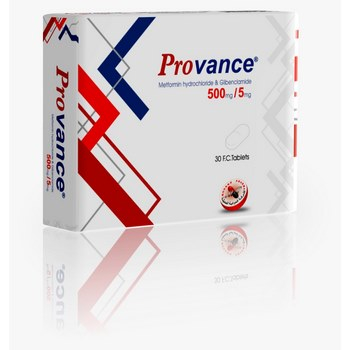provance 500/5
Properties
- Glibenclamide (also known as Glyburide) belongs to a group of
anti-diabetics called sulfonylureas. It works by increasing the amount of
insulin released from your pancreas.
- Metformin belongs to a group of anti-diabetics called biguanides. It
works by helping your body make better use of insulin.
- Diabetes mellitus type 2 is a chronic disease where your body is not able
to make enough insulin and/or respond normally to insulin. Insulin is a
hormone secreted by the pancreas that lower sugar (glucose) levels in the
blood. When this happens, glucose builds up in the blood. This can lead
to serious medical problems.
- Diabetes can be managed with a proper diet and regular exercise. When
these are not enough, medication is added to control your blood sugar
levels.


